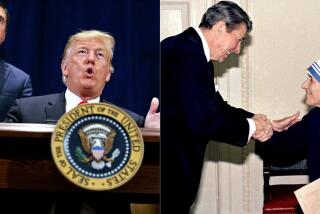Reagan Renews Backing for Anti-Soviet Guerrillas
- Share via
WASHINGTON — President Reagan on Saturday called on the Soviet Union to set a timetable for withdrawal from Afghanistan and said he warned Soviet leader Mikhail S. Gorbachev at Geneva that the United States will support all “freedom fighters” against Soviet-backed regimes.
In a radio address summing up the unusual one-on-one talks last week with Gorbachev, Reagan for the most part recapitulated what he told Congress in his Thursday night speech, but he placed new emphasis on his Administration’s posture toward Soviet expansionism in the Third World.
“I made it clear in Geneva that America embraces all those who resist tyranny and struggle for freedom,” Reagan said in his weekly radio talk. “Breaking faith with freedom fighters would signal that aggression carries no risk. And this we will not allow.”
Regional Conflicts
Reagan stressed that “regional conflicts were prominent in our discussions” at Geneva and that “we’ll be watching very closely for any change in Soviet activities in the Third World.”
Noting that the United Nations has several times called for Soviet withdrawal from Afghanistan and that a new round of U.N.-sponsored talks on Afghanistan is to begin next month, Reagan added, “If these talks are to succeed, the Soviets must provide a timetable for getting out and recognize that the freedom fighters will not be conquered.”
Reagan’s renewed emphasis on regional conflicts came as the Administration is nearing a decision on whether to provide covert aid to guerrillas who have been fighting for a decade to overthrow the Soviet- and Cuban-backed Marxist government of Angola.
Reagan, addressing editors and columnists during a post-summit briefing on Friday, said, “We all believe that a covert operation would be more useful to us and have more chance of success right now than the overt proposal that has been made in the Congress.”
Spurred by Secretary of State George P. Shultz, the Administration has opposed several bipartisan initiatives in Congress to send $27 million in so-called humanitarian aid and a like amount in military aid to the National Union for the Total Independence of Angola, led by Jonas Savimbi.
Aid From South Africa
Until last summer, when 1975 legislation banning all U.S. aid to rebel groups in Angola was repealed, Savimbi’s only source of open support had been South Africa, a fact that has led State Department Africa specialists to balk at an overt aid program.
But Reagan has often spoken out in favor of Savimbi’s rebels as “freedom fighters,” most recently in his Oct. 24 speech to the U.N. General Assembly.
UNITA, a Portuguese acronym for the rebel group’s name, in a decade of fighting, has gained effective control of many rural areas not under direct control of Cuban troops. In recent months, Savimbi’s forces have held off a major government offensive.
On Nov. 1, the State Department issued a policy statement backing aid to UNITA, provided the effort would not undermine other Administration policies in southern Africa. This led to reports, uncorroborated until Reagan’s disclosure, that Shultz would back a covert aid operation, channeled through the CIA and neighboring African countries.
Asked Friday why Shultz is against aiding Savimbi’s forces,” Reagan replied, “He isn’t,” and then divulged that he now favors a covert aid program. Asked for his own view later during the same White House briefing, Shultz cautiously avoided any mention of covert aid. He said he opposes the open aid programs before Congress “because we want to be as helpful as we can in a way that’s effective. We don’t think that the program that’s proposed will do that.”
SALT II Pledge Denied
Meanwhile, the Administration denied a published report that the Soviets were given a pre-summit promise that the United States would “indefinitely” continue its declared policy of not undermining the unratified 1979 SALT II treaty so long as the Soviets did likewise.
“There has been no such vow,” State Department spokesman Daniel Lawler said Saturday. “The U.S. policy announced in June has been discussed with the Soviet Union on several occasions. There has been no change in that policy.”
In a statement on June 10, Reagan said the United States would dismantle a missile-carrying submarine under the deadline set by the second strategic arms limitation treaty and would continue to abide by the treaty’s arms limits, provided the Soviet Union:
--Exercises “comparable restraint” in observing the same limits.
--”Actively pursues arms reductions agreements” in ongoing talks at Geneva.
--Takes “required effective action” to correct existing violations of the SALT II limits and of earlier arms agreements.
If past violations could not be explained, Reagan said at the time, the United States “reserves the right to respond in an appropriate manner in an appropriate time.” At the same time, Reagan ordered a comprehensive Pentagon report on the Soviet record of compliance with past arms agreements, a report that was delivered to him only a few days before the summit.
Reagan made it clear during his Friday interview that the issue of SALT II compliance is still open. Asked what he told Gorbachev on the question of continued U.S. observance of SALT II limits, he replied:
“All of this was discussed, and I made it plain . . . that we certainly were not going to bind ourselves with something that was not equally binding on them.”
Asked how Gorbachev responded to the allegations of 23 Soviet arms treaty violations, Reagan said, “We didn’t get an answer to that one.”
More to Read
Sign up for Essential California
The most important California stories and recommendations in your inbox every morning.
You may occasionally receive promotional content from the Los Angeles Times.













